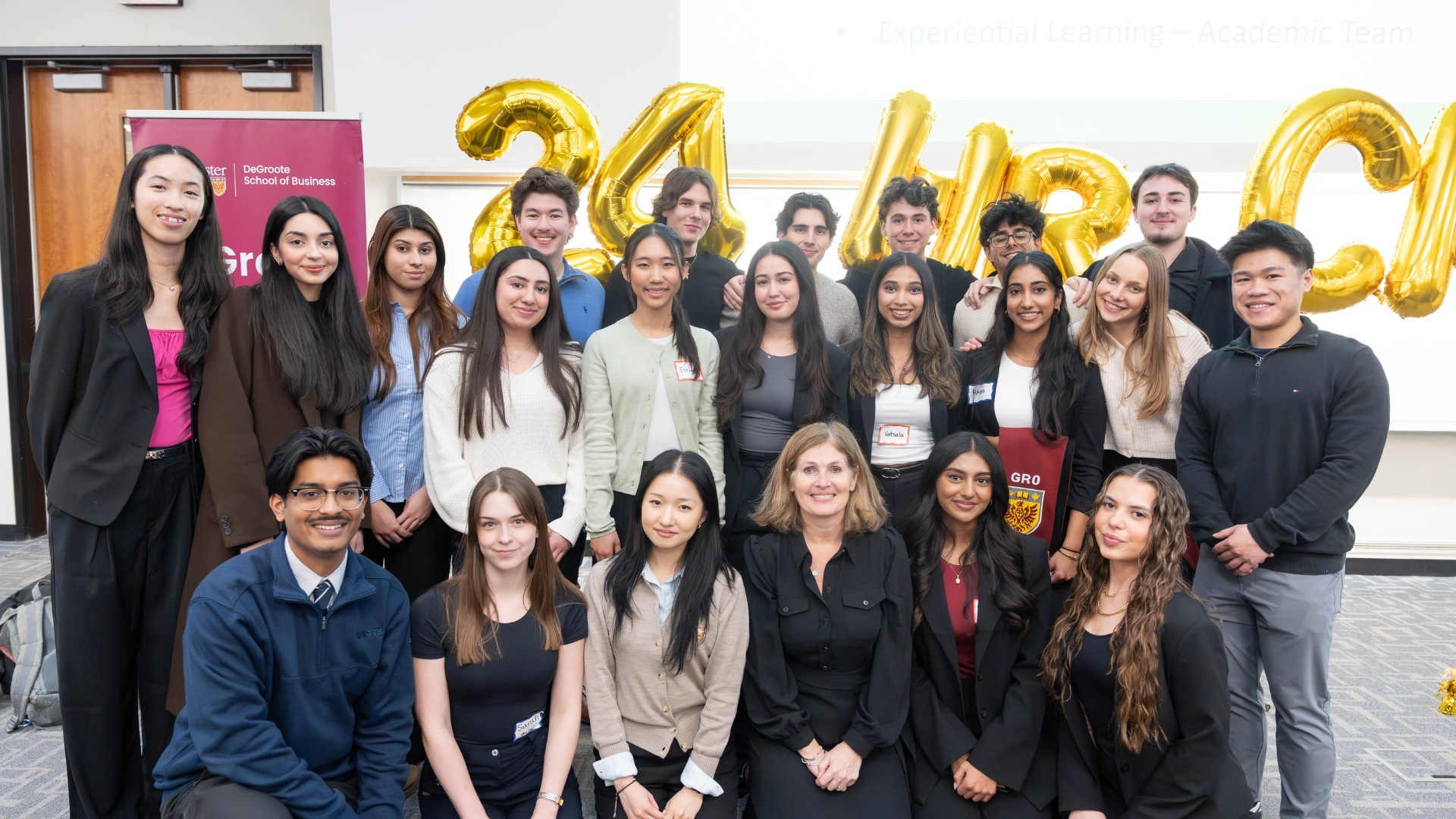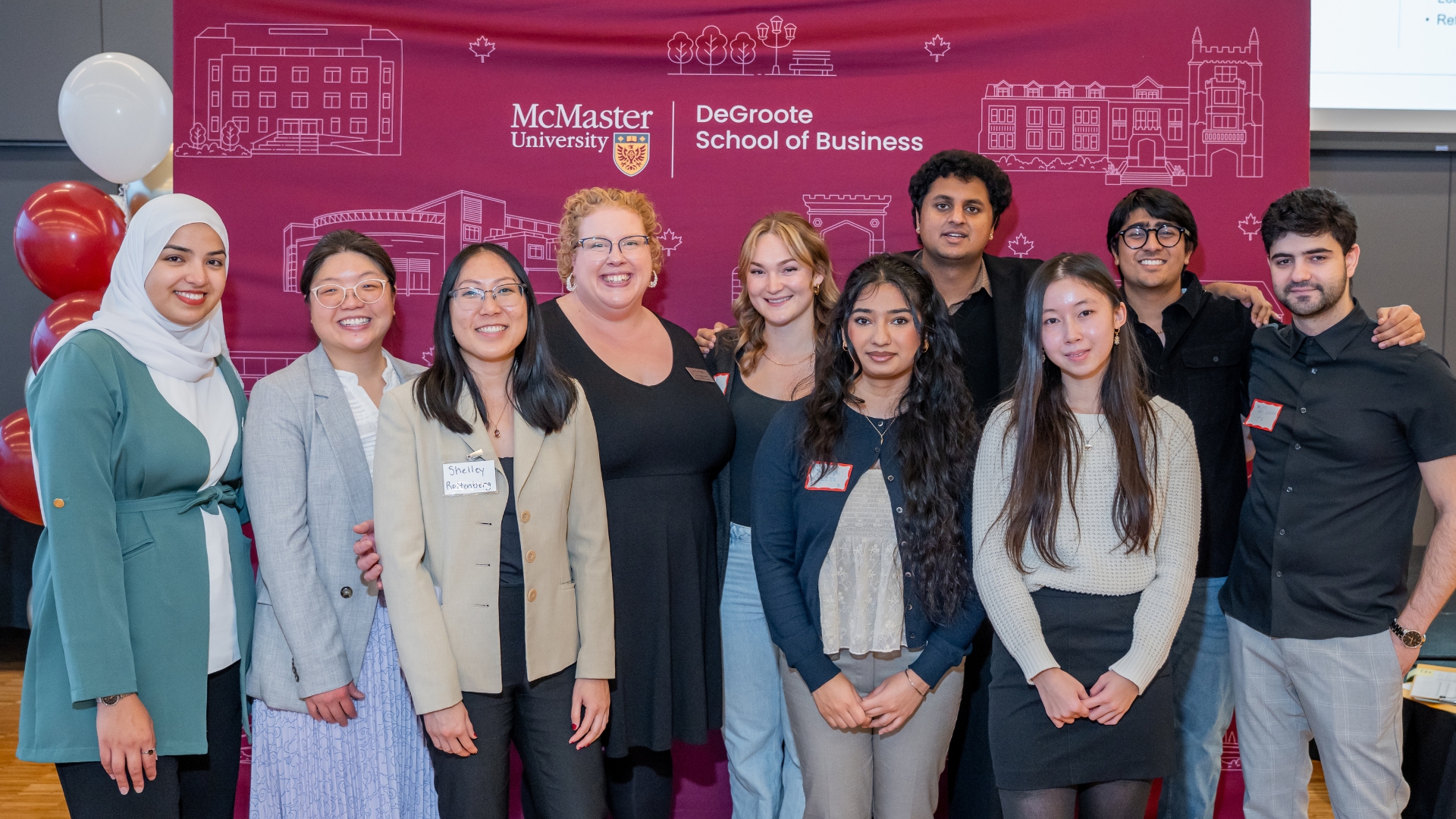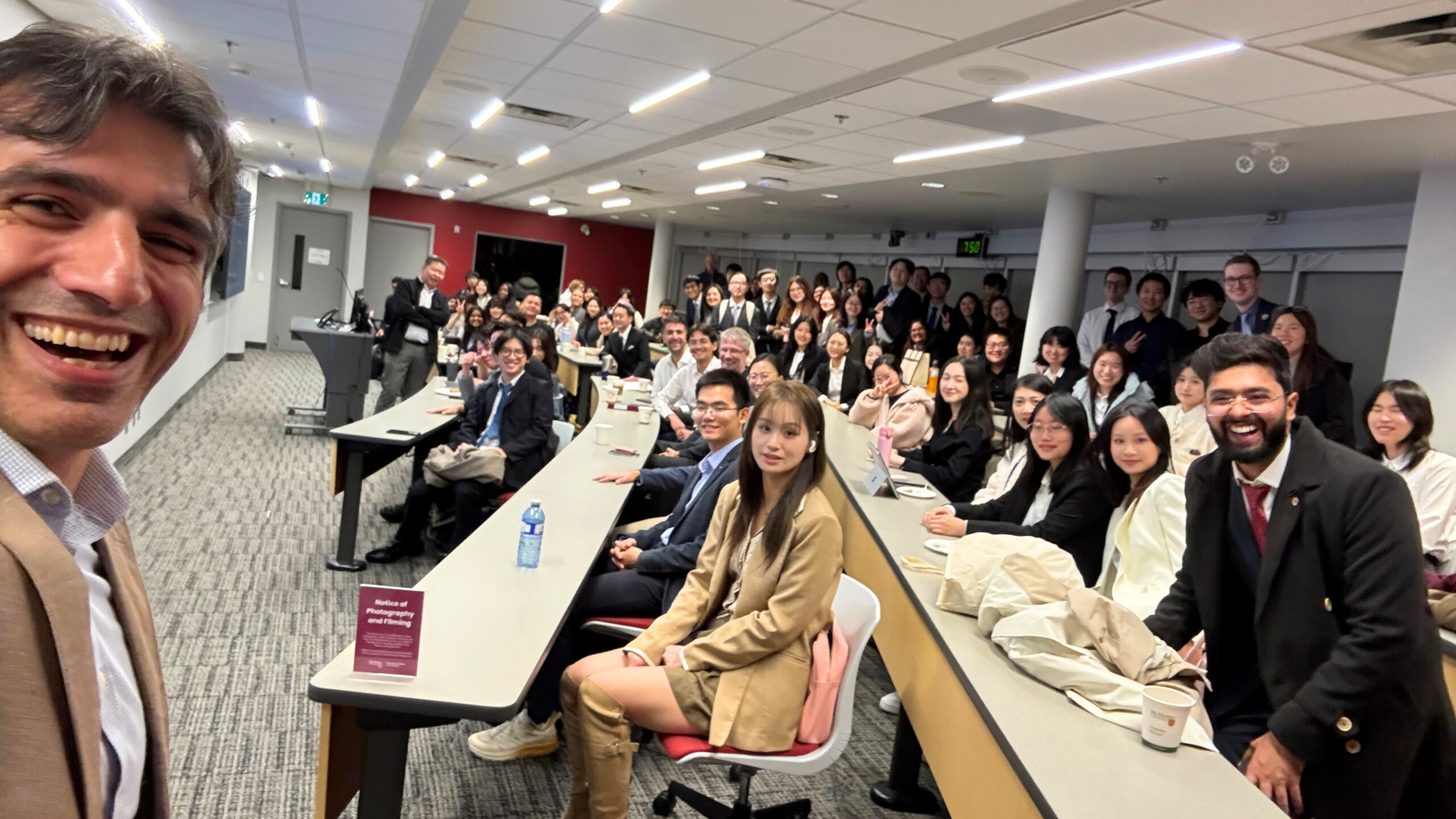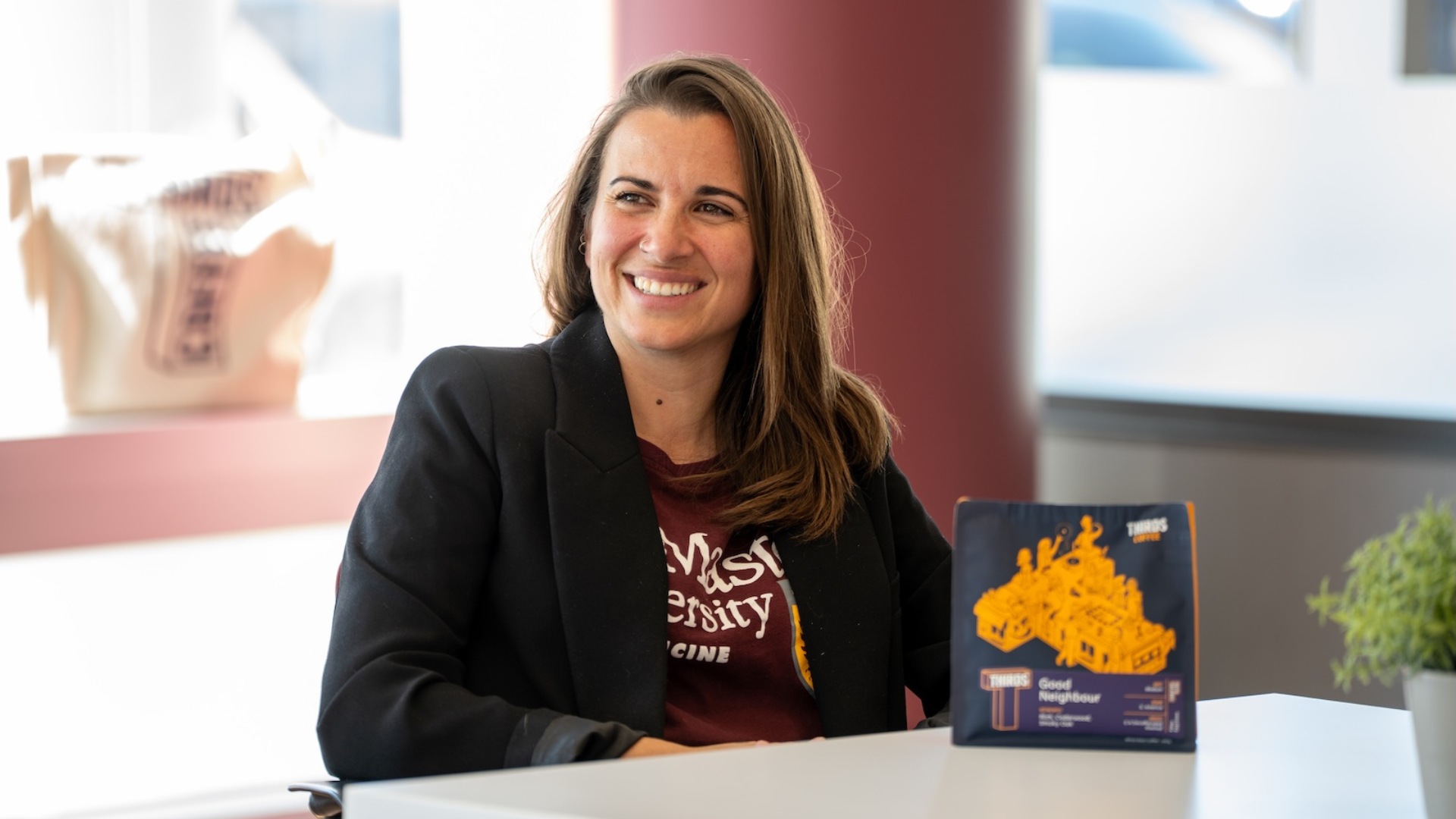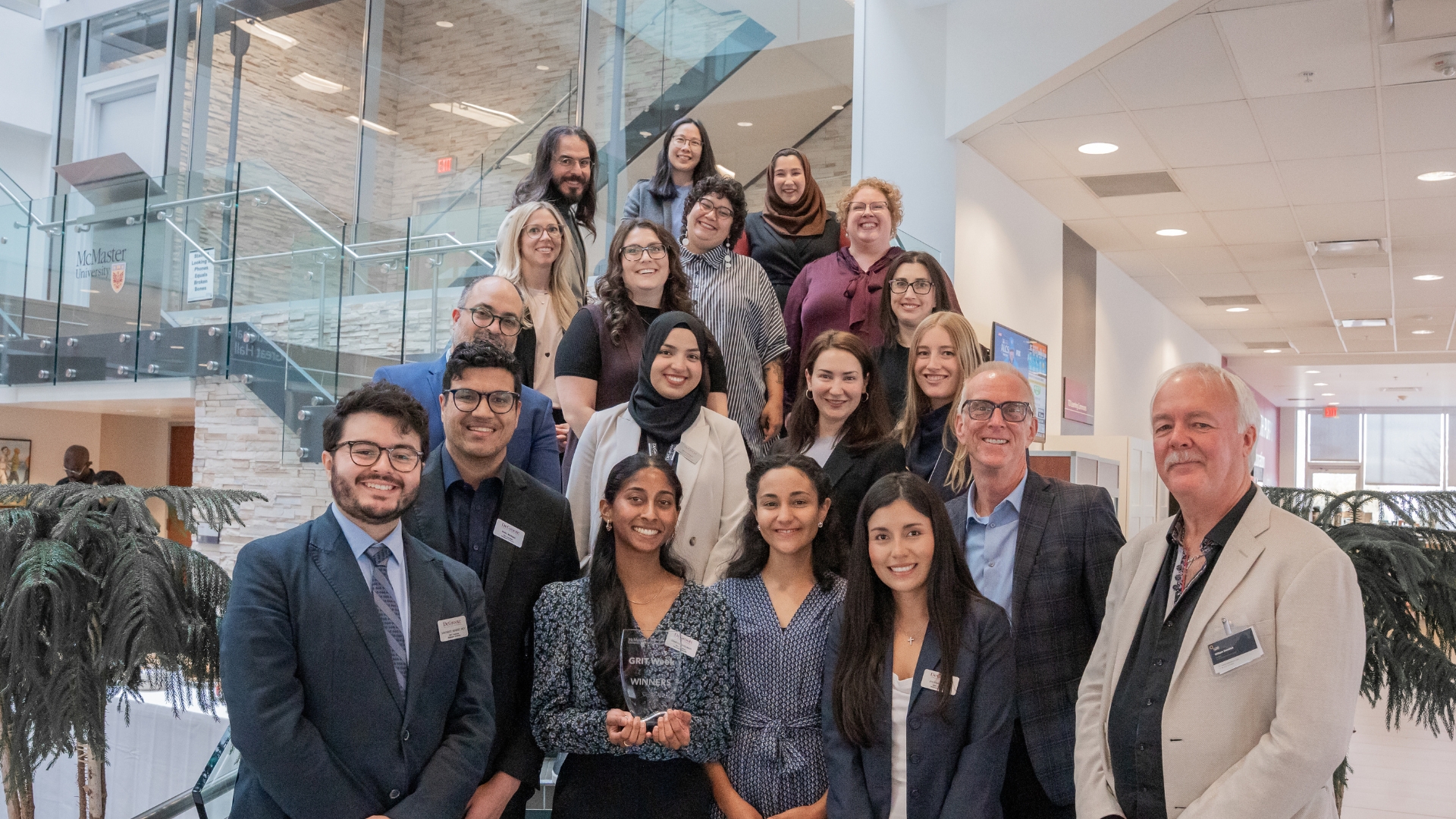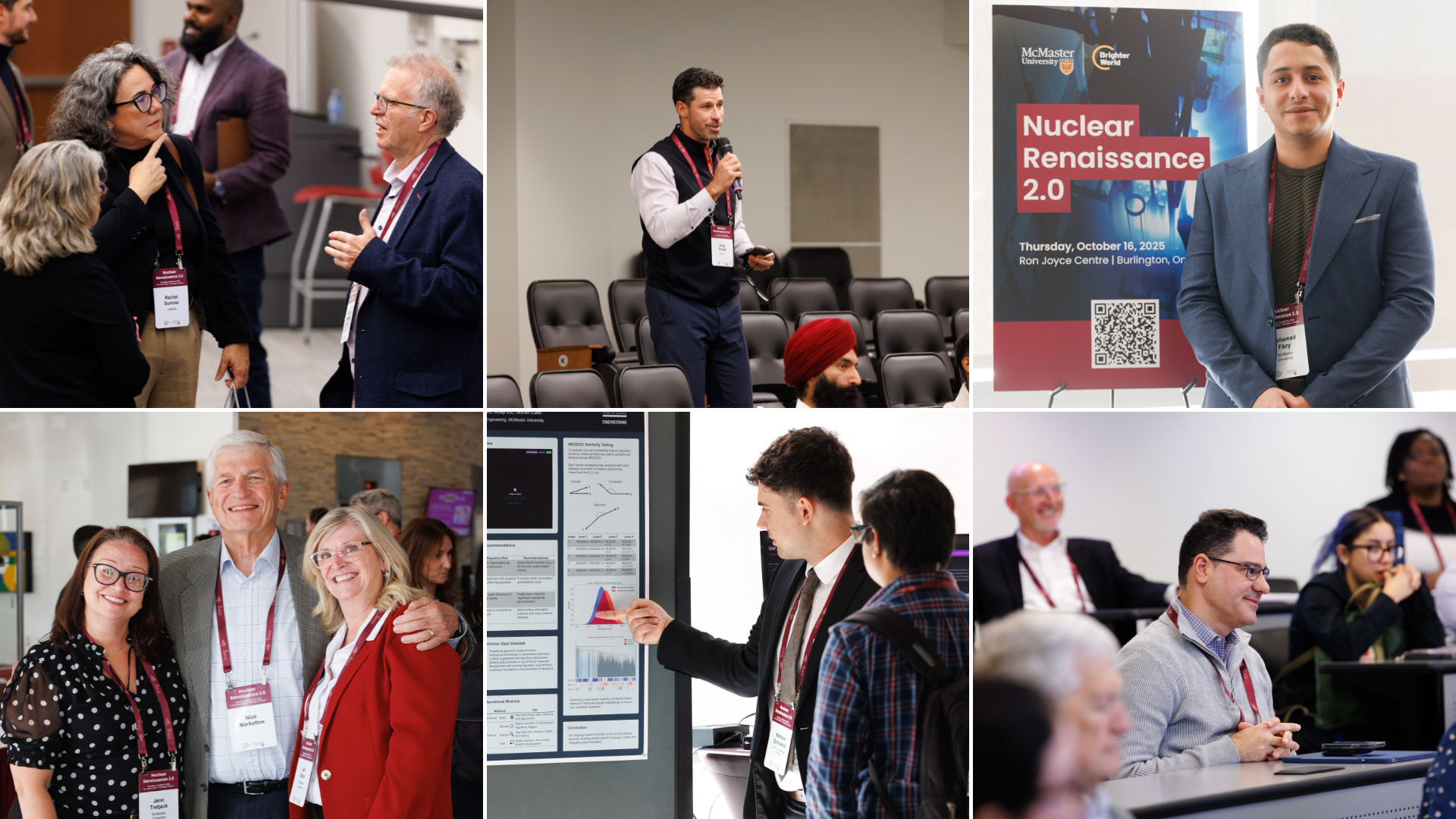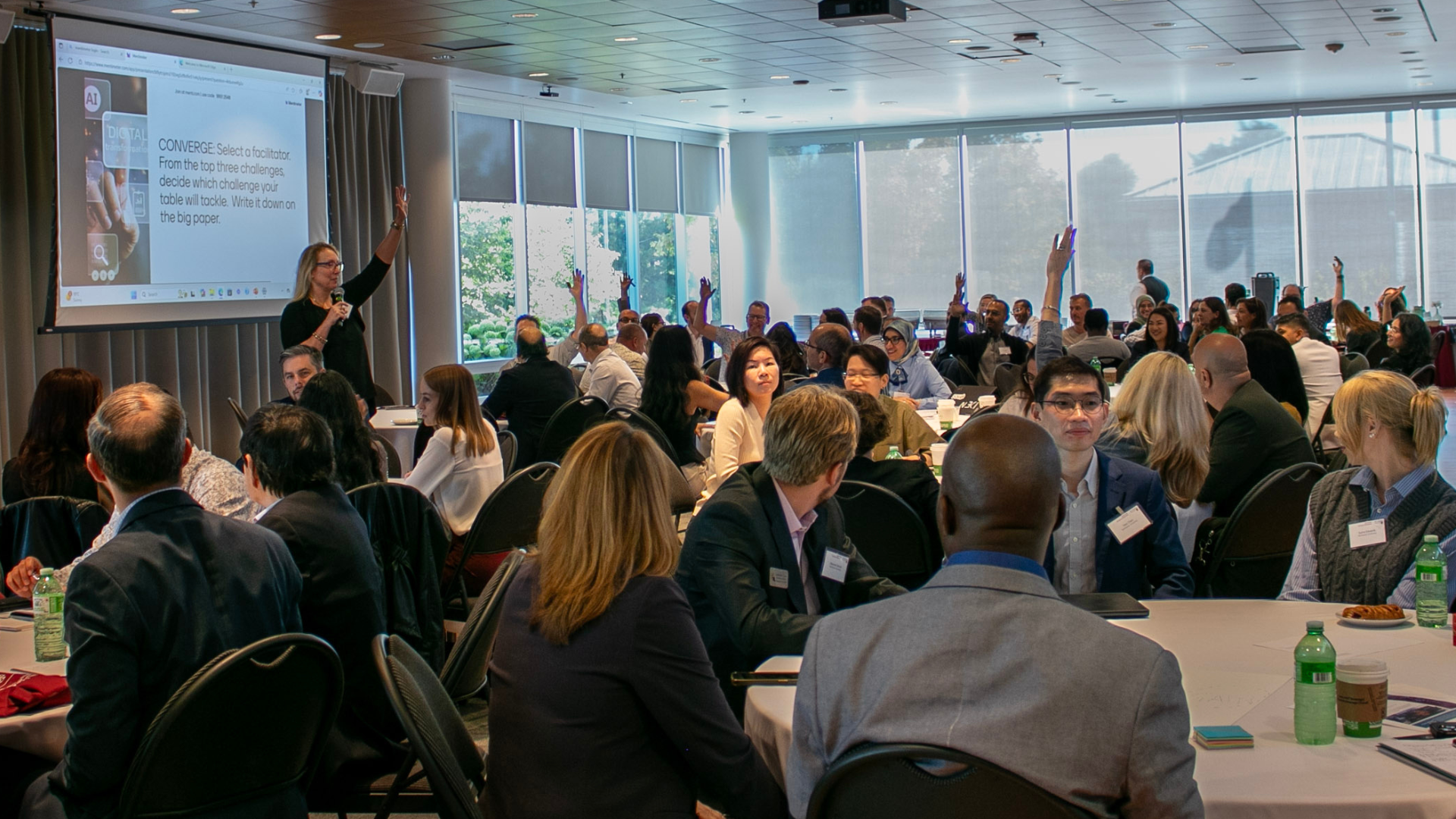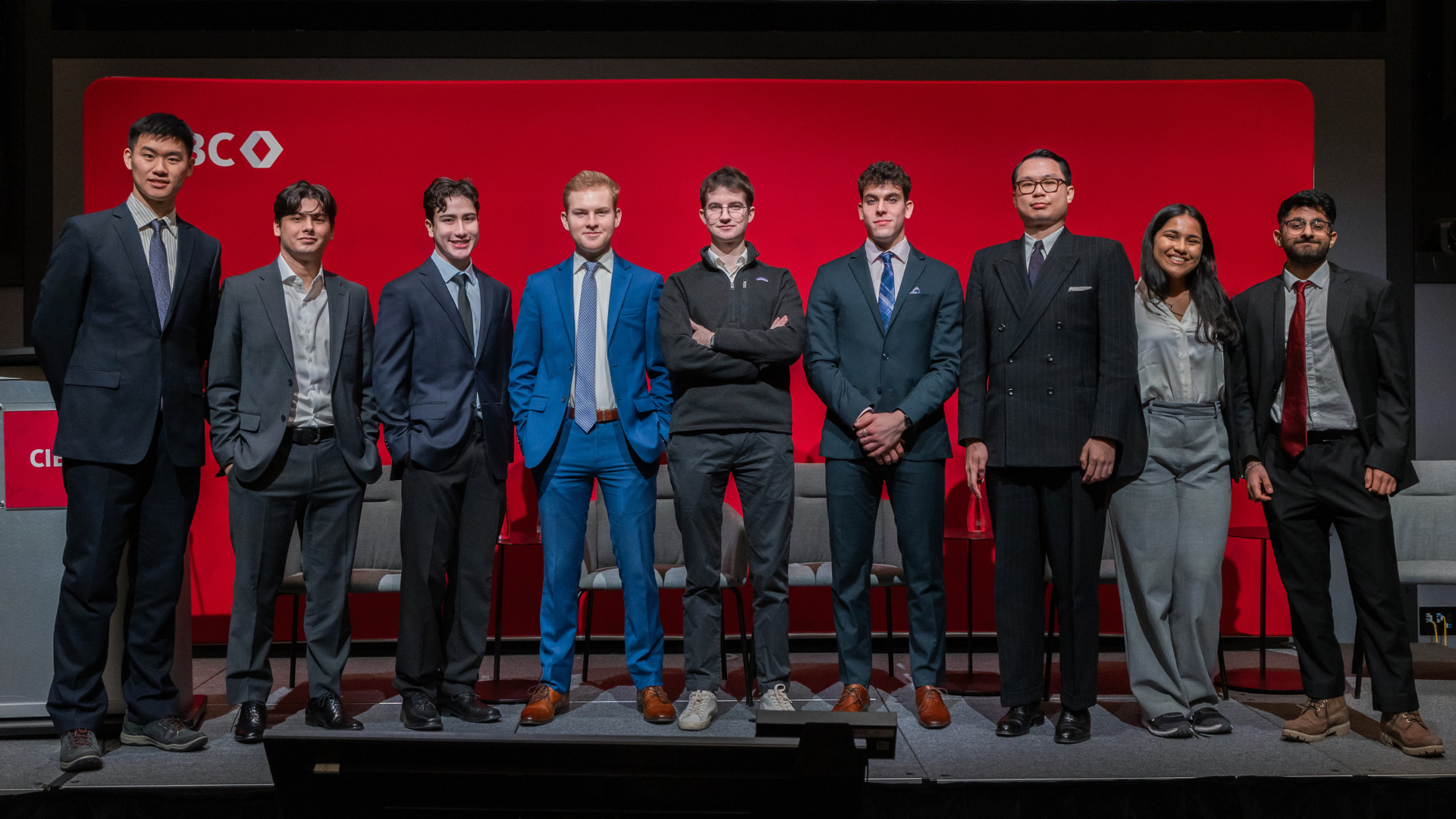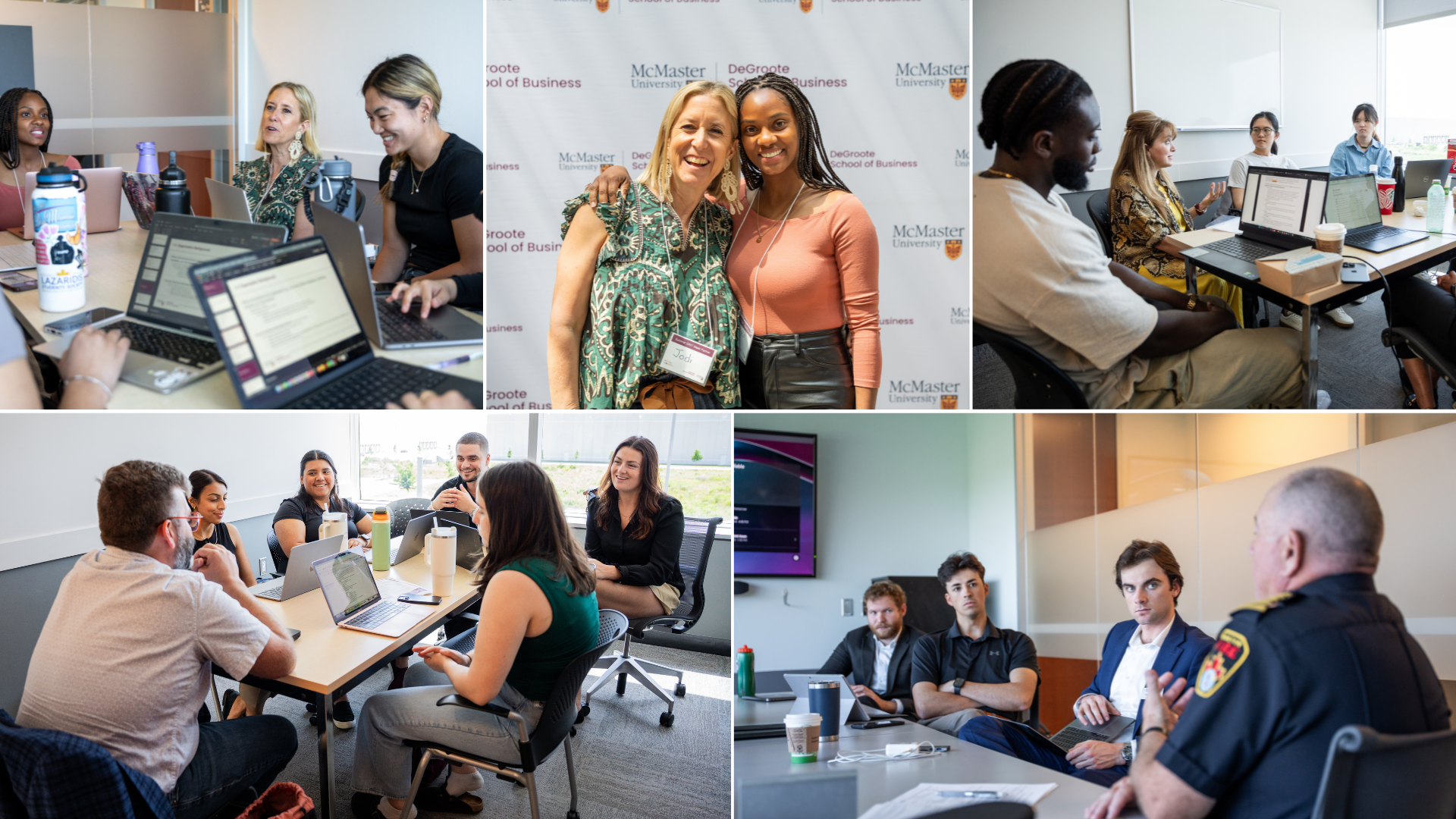STRATEGIC PLAN | TEACHING AND LEARNING
DeGroote redefines grit
December 17, 2024 ·
Contributed by: Izabela Shubair, DeGroote Contributor
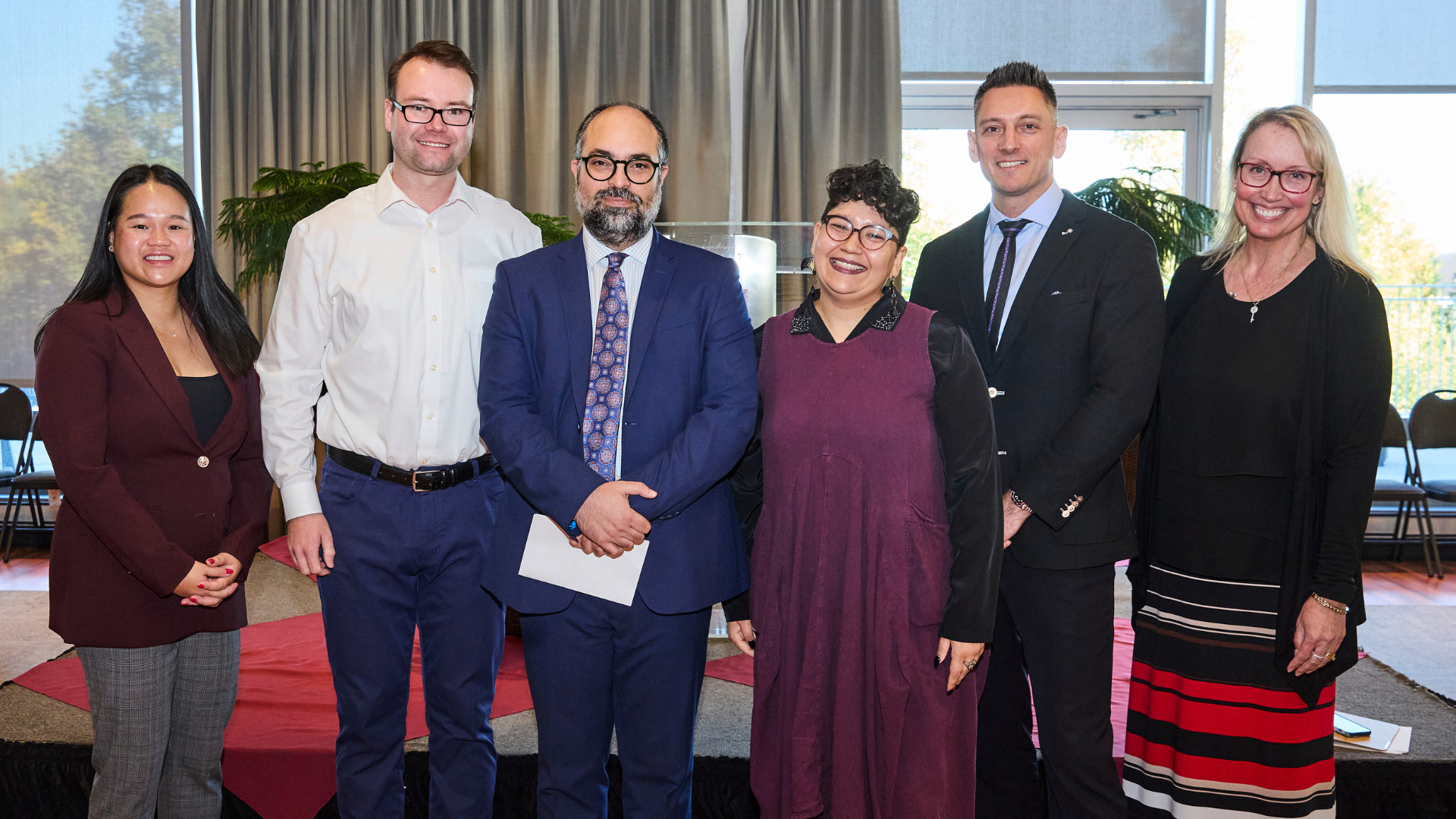
From left to right: Erica Dao, former manager of nuclear education and outreach at McMaster; Darcy Oberding, instructional assistant, Student Experience, MBA in-course programs; Behrouz Bakhtiari, acting director of the MBA programs and assistant professor of operations management; Amy Pachai, educational developer, Teaching and Learning Services; Goran Calic, MBA director and associate professor of strategic management; and Milena Head, academic director of the EMBA program and professor of information systems.
For three days, Darcy Oberding observed DeGroote MBA students grappling with a multifaceted business case intentionally void of easy answers. They engaged in mini-challenges that tested their abilities under tight deadlines, faced unexpected twists and turns and collaborated with peers they had not worked with before. All the while, students were immersed in an industry they were largely unfamiliar with, adding another layer of complexity.
Throughout this intense and unique journey, students’ discomfort with uncertainty was palpable.
However, on the fourth and final day of GRIT Week — an immersive case experience designed to be a cornerstone of DeGroote’s newly revamped MBA program — Oberding noticed something transformative. While the nervous energy of the previous days lingered, students now exhibited a “whatever comes our way, we’ve got this” attitude.
Oberding, an instructional assistant in DeGroote’s Student Experience office, recognized that he was witnessing remarkable growth. Students were embodying the principles that faculty, staff and stakeholders aspired to cultivate during the initiative aimed at Generating Resilient Integrative Thinkers (GRIT).
“The MBA of the future has to transcend some of the traditional models,” says Oberding, who works specifically on in-course programs within the MBA, such as GRIT Week.
“Being a leader now includes leading organizations through periods of disruption. It also means doing so across teams and cross-functional areas, so the ability to collaborate is as imperative to success as being resilient. GRIT Week gives students the opportunity to understand the implications of change and develop leadership skills to navigate disruption effectively.”
The making of GRIT Week
In fact, recent research by Deloitte reveals that 83 per cent of digitally maturing companies utilize cross-functional teams. Additionally, analytics leader SAS indicates that 97 per cent of executives view business resilience as crucial. In response to such evolving business needs, DeGroote decided to redesign the first year of its two full-time MBA programs. The Full-Time MBA is tailored for learners with up to seven years of work experience, and DeGroote’s flagship Full-Time MBA with Co-op is geared towards those with less than four years of work experience. The new programming was implemented in the Fall 2024 semester.
The revision process began in 2022 when a cross-functional team of faculty and staff gathered insights from various stakeholders. As they consulted faculty, staff, current and prospective students and employment partners, alumni and competitors, two key themes emerged.
First, the redesign team identified an opportunity to better showcase the unique value propositions of the co-op and full-time MBAs, which previously shared a common first semester. As a result, co-op students now take a set of courses that prepare them for their first co-op work term. Full-time learners, meanwhile, complete an eight-month consulting project that leverages their previous work experience.
Second, the previous first-year curriculum, in place since 2013, offered combined courses, which was beneficial in highlighting connection points between two areas but ultimately created program silos. The compressed structure also left little room for students to reflect on their learning. The redesign streamlines classes, coursework and schedules to offer an uncompromised education and a balanced workload while highlighting an experiential focus. It also creates opportunities for intentional integrative experiences, such as GRIT Week.
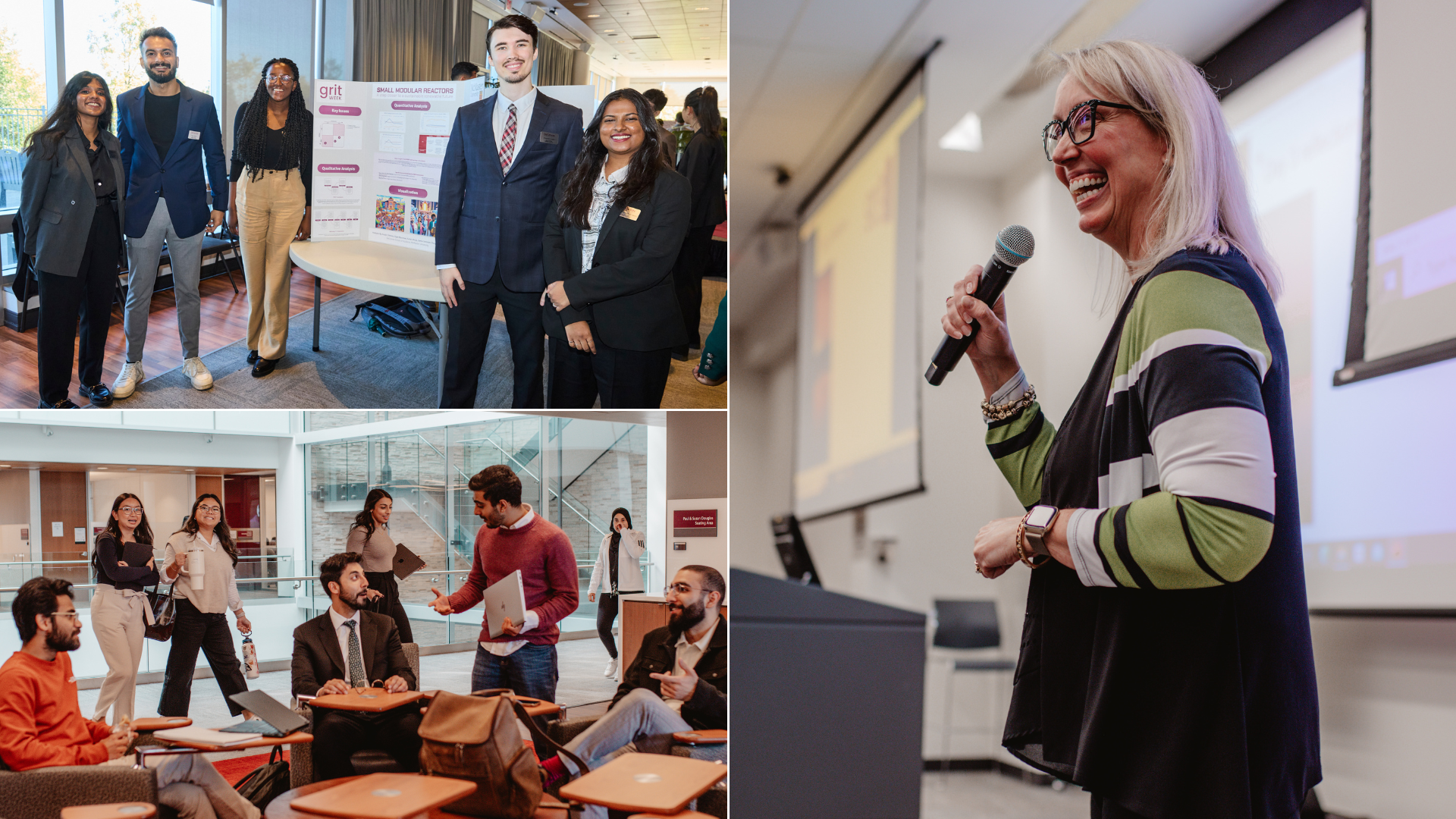
Milena Head, the academic director of the EMBA program and a professor of information systems, spearheaded the redesign.
“We wanted integration to happen more organically,” says Head. “Rather than bringing two courses together in a forced marriage, we wanted students to actively think about applying knowledge from varying subjects meaningfully. For example, some courses may have common assignments that look at a specific data set from different angles or case studies may be done across courses.
“This is also the seed for GRIT Week, where students are forced to think about how to bring in, for example, finance, accounting, strategy, human resources and communications knowledge to solve a business problem.”
The redesign team also considered that MBA students often feel uneasy about not having all the answers and strive for perfection in their work. Many of them expect clear grading rubrics to help guide their efforts. However, understanding that the realities of the workplace can be quite different, the team took the concept of a dedicated integrative activity further. They focused on building resilience by purposefully introducing elements of uncertainty, such as time constraints and disruptions.
“If we look at resiliency, uncertainty is inherent in that process,” says Oberding. “To create an environment where students could try to succeed and possibly fail in a way that will not impact them negatively, we ensured the stakes were not too high from a grading standpoint.
Instead, GRIT Week is their opportunity to test the limits, put into practice their early learnings and be present in an experience that simulates some of the conditions they will face in their careers.”
Amy Pachai, an educational developer in DeGroote’s Teaching and Learning Services department, works with instructors, students and administration to design and deliver innovative and engaging learner-centred education. Pachai says the redesign team itself embodied grit and took an integrative design approach to bring GRIT Week to life.
“We believe in the power of community at DeGroote,” she says. “I, for example, can’t represent all the different areas and skill sets of DeGroote staff and faculty, so relying on diverse expertise was the only way to create an authentic integrative experience for students. In my six-and-a-half years at DeGroote, this was one of the most cross-functional and integrative projects I have been involved in.
“Through every step of the process, it was evident that this is a student-first approach to education. We considered the challenges students will encounter in the workplace and the skill sets needed for the future of work.”
Visceral learning in action
The week-long live case experience takes place midway through both semesters of the MBA program’s first year. While each GRIT Week will feature different content, DeGroote faculty emphasize that the core principles remain consistent. For example, students enter GRIT Week with limited information about what to expect and are paired with classmates from the MBA cohort whom they haven’t collaborated with before. They dive into a complex business problem that doesn’t have a clear-cut solution. Throughout the week, students face unexpected tasks as they work on a poster they present at a tradeshow-style event.
“This is experiential learning in that students are not in class looking at an overhead projector,” says Goran Calic, MBA director and associate professor of strategic management. “It is not experiential in that students work with a hypothetical scenario rather than a real-world company. The best way I can describe it is visceral learning.
Students experience the diversity of emotions they would in a workplace and get better at thinking and feeling when those emotions are present. This is key to the resilience-building component of GRIT Week.
“When you are stressed, can you stay calm and level-headed? When you don’t get something done because of time constraints, can you explain to stakeholders what you could have done better if you had more time? This is something we haven’t done at DeGroote before. It’s very hard with in-class learning because you must simulate the consequences of things going wrong to help students develop their ability to prepare in the moment.”
From Oct. 15 to 18, around 150 MBA students at DeGroote paused their classes to participate in the inaugural GRIT Week. The event focused on nuclear science as a promising solution to the pressing need for sustainable and renewable energy. To facilitate the experience, DeGroote teamed up with McMaster Nuclear Operations and Facilities (MNOF).
Students were challenged to create and present a deployment plan for a Small Modular Reactor (SMR), an innovative technology that can generate power, provide process heat, desalinate water or serve various industrial purposes. Additionally, they were tasked with developing business strategies to promote the adoption of SMRs as a critical component of Canada’s clean energy strategy.
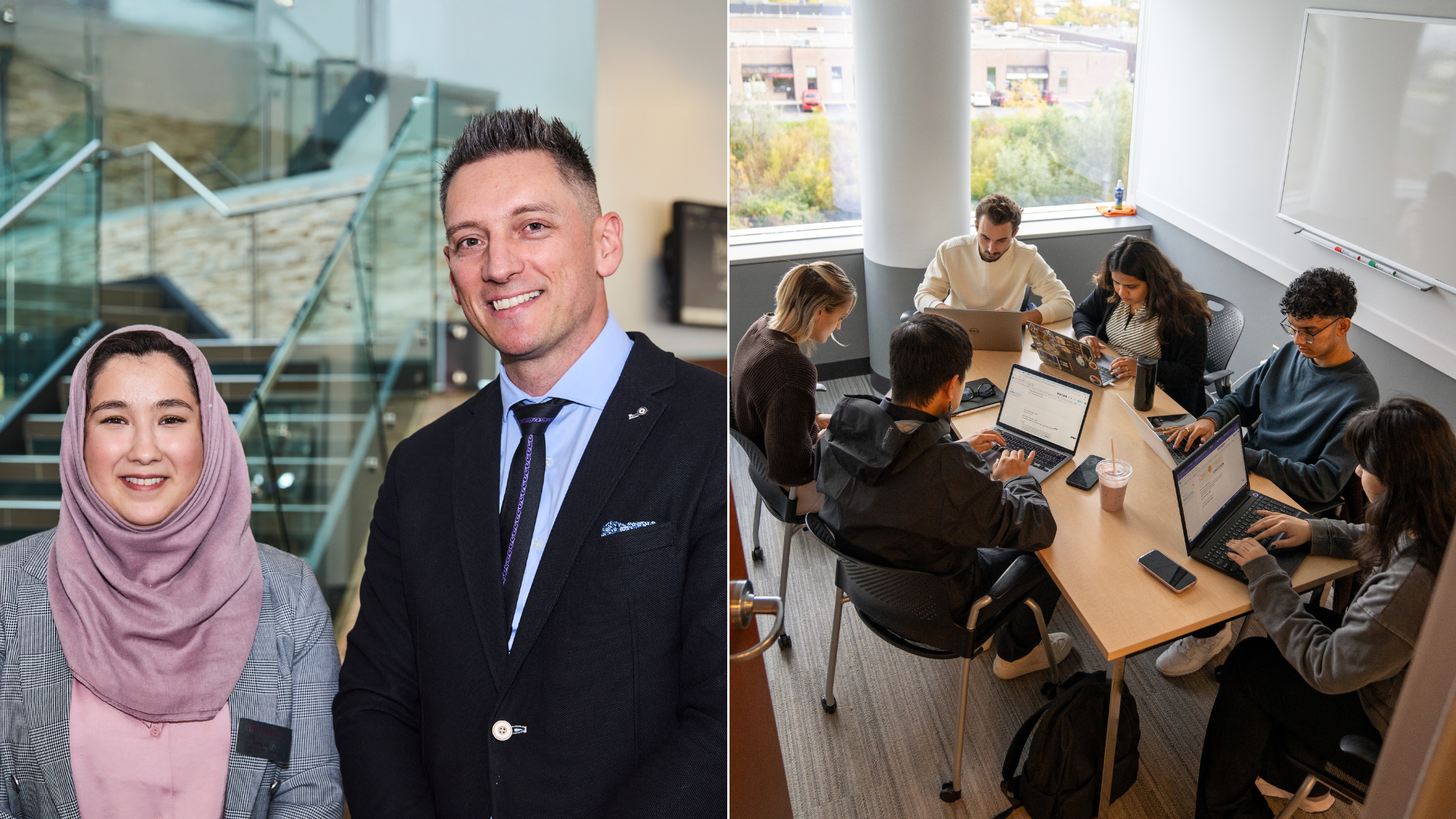
“We wanted to ensure students were thrown in the deep end with a brand-new technology and challenging business problems which they had to solve in real-time,” says Calic. “SMRs are a new leading-edge technology in an underappreciated industry that is seeing a huge renaissance, so working with MNOF provided incredibly rich content for our students. This week was completely novel, with many moving pieces, so having the right partner was vital.”
GRIT Week also presented faculty with an opportunity to create organic connections between first-year and senior MBA students, further breaking down program silos. Second-year students not only participated in the week’s central disruption event, a mock protest, but they also judged GRIT participants’ elevator pitches. This integration, says Head, benefited both sets of learners.
“First-year students loved getting insight into where they’ll be in two years,” she says. “They appreciated the realization that mentorship comes from many different places, not just from faculty or staff. Senior students got to see what it’s like to be a mentor and the importance of constructive and positive feedback. It became obvious that some connections students made will last a long time.”
Reflections and a look ahead
The primary learning outcomes of GRIT Week, says Pachai, can be summed up in three key areas: resiliency, integrative thinking and collaboration. These objectives align with the goals of the MBA program redesign and mirror the challenges students will encounter in their professional journeys and the evolving world of work.
As the team gears up for the next GRIT Week, it is already gathering student feedback and is eagerly looking to refine the experience and introduce exciting new elements. It is also exploring opportunities to partner with different industries that leverage McMaster’s strengths, including its ties to the healthcare sector and to the Hamilton community. Pachai emphasizes that DeGroote’s commitment to making GRIT Week a vital part of the MBA program showcases the business school’s dedication to preparing students for success in the years ahead.
“Future leaders need to adapt to a rapidly changing business world and not feel discouraged or demotivated when facing changes, which can be challenging,” she says.
“To prepare them, we know students require more than a defined set of skills that they will need to upskill in three to five years. They need to develop the right attitudes and beliefs to be able to approach their work with confidence in times of uncertainty. These were some of the lenses we tried to remember when developing GRIT Week and what makes the MBA so valuable.”

